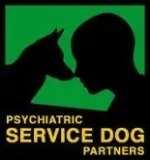There are a few different reasons someone in the US might ask for a "service dog letter" from their healthcare provider—a letter supporting their (planned) use of service dog. Each reason has different requirements for what's in the letter.
We'll cover the requirements for a general letter, a housing letter, and a workplace accommodation letter. People with service dogs in the US shouldn't need letters for any other reason related to federal laws. State laws can add rights to federal disability laws, but can't take them away. Those who want a service dog from a program or have another personal reason may need to get a letter that meets other specific requirements.
Please remember that a service dog user should not show a letter or service dog ID card in order to gain entry to public places like stores, hotels, hospitals, etc. Since no letter or ID is required for public access in the US, if you show a letter, you are training the gatekeeper that they should ask the next service dog team for a letter. This makes the life of the team coming after you miserable! Some of the worst access challenges happen when a service dog user comes after someone who has shown a letter or ID in order to gain access, and they expect the same of you.
In general, it is a good idea for a (prospective) service dog user to bring the exact text of the letter they want written to their provider's office, and ask them to simply put that text on their letterhead and sign it. This is important because many providers inadvertently make little alterations, which can lead to a big legal difference. We also recommend never putting a specific diagnosis into a service dog letter, since it is unnecessary and can invite discrimination or uncomfortable conversation.
Any medical professional who is treating someone for their disability can write a service dog letter. That could be a psychiatrist, therapist, social worker, general practitioner, neurologist, nurse, nurse practitioner, etc. If one of a disabled person's providers won't write the needed letter, that person can ask any other provider who treats them.
General letter
While there is no legal need in a service dog user's day-to-day life for a general letter of support, having one can be extremely helpful should they ever end up in court over some unexpected incident. It gives a timeline for when they started using (or planning to train) a service dog. This can be helpful in proving that at the time of the incident, their dog was a service dog.
A service dog user should never legally need to show this letter to anyone except in a court situation. In supporting a disabled person's planned service dog use, the medical professional is not responsible for the behavior of an animal owned by someone else. For all service dog letters, we recommend the service dog user and medical professional each keep a copy of the letter wherever important papers are stored.
The dated letter should be on the provider's letterhead with contact information, include any licensing information, and should read as follows:
[Date]
To Whom it May Concern:
[Client's full name] is my client, whom I am treating for a life-limiting disability. I support their use of a service dog for their disability.
Sincerely,
[Signed by provider, with typed name and license information]
Housing letter
If a disabled person has a service dog—as opposed to a "service dog in training"—they do not need a letter for housing places that are covered by the Fair Housing Act. (On PSDP's housing page, there's info about topics like which dwellings are exempt from the Fair Housing Act.) With a service dog, the service dog user simply has to answer the two questions from the Americans with Disabilities Act (ADA). Those are: (1) "Is the animal required because of a disability?" and (2) "What work or task has the animal been trained to perform?".
 Remember that you do not need to tell anyone the diagnosis (privacy matters). Instead, the service dog user can describe in general terms how the service dog helps. The service dog user may answer the questions verbally, but it is smart for them to follow up in written form with the housing provider immediately afterward. A simple email or (saved) text exchange is fine, as long as it clearly confirms the disability accommodation agreement.
Remember that you do not need to tell anyone the diagnosis (privacy matters). Instead, the service dog user can describe in general terms how the service dog helps. The service dog user may answer the questions verbally, but it is smart for them to follow up in written form with the housing provider immediately afterward. A simple email or (saved) text exchange is fine, as long as it clearly confirms the disability accommodation agreement.If the animal is not a service dog but still counts as an assistance animal, there are different rules. "Assistance animal" in the housing context includes trained service animals and untrained support animals, all of which must help a disabled person to qualify. A service dog in training may qualify as an assistance animal in housing if it helps the disabled person.
The document linked below from the Department of Housing and Urban Development (HUD) explains the requirements for assistance animals. The specifics for assistance animals that are not service dogs starts on page 7.
https://www.hud.gov/sites/dfiles/PA/documents/HUDAsstAnimalNC1-28-2020.pdf
A housing service dog letter should confirm the person has a disability, though not what their diagnosis is. It should also establish the disability-related need for the assistance animal. If the assistance animal is not an animal commonly kept in a household, there are additional requirements—see the document linked above for details.
Below is a sample letter for an assistance animal in housing. As with a general letter, the dated letter should be on the provider's letterhead with contact information and include any licensing information. It should read as follows:
[Date]
To Whom it May Concern:
[Client's full name] is my client, whom I am treating for a physical or mental impairment that substantially limits one or more major life activities or bodily functions. I support their use of a dog as an assistance animal. My client's disability causes them difficulty with [insert limitation here, it could be "leaving the house", "maintaining emotional stability", "sleeping", "remembering to take medication", "social interaction", etc]. The assistance animal mitigates their disability by [insert help provided here, it could be "regulating emotions", "responding to their medical condition", "encouraging them to leave the house", "facilitating social interactions", "regulating their sleep", "preventing or interrupting impulsive behaviors", "reminding them to take medication", "providing emotional support", etc].
Sincerely,
[Signed by provider, with typed name and license information]
Workplace accommodation letter
The Job Accommodation Network has wonderful information regarding service animals in the workplace. Here is their webpage:
https://askjan.org/topics/servanim.cfm
In order to bring a service animal into the workplace as a disability accommodation, an employee must request a reasonable accommodation. The request for reasonable accommodation should document that the person has disability, why the service animal is needed, what it does, that it is trained to behave, and a description of how it will not disrupt the workplace. Some of this information will come from the healthcare provider, while other information may come from a dog trainer or from a demonstration of the animal's behavior, such as through a trial period.
Minimally, the letter from a healthcare provider should document the person's disability. If possible, it would be helpful for the letter to also include information on how the animal helps with the person's disability. The part of the ADA that deals with employment doesn't define "service animal". This means it is possible—but not guaranteed—that a disabled person could get an accommodation with an animal that helps by its untrained presence, as long as it is trained to behave in the workplace.
Below is a sample healthcare professional service dog letter for workplace accommodations. As with the general and housing letters, the dated workplace accommodation letter should be on the provider's letterhead with contact information and include any licensing information. It should read as follows:
[Date]
To Whom it May Concern:
[Client's full name] is my client, whom I am treating for a life-limiting disability. I support their use of a service dog. My client's disability causes limitations with the following major life activities: [insert limitations here, which could be "maintaining low anxiety", "interacting with others", "remembering to take medications", "avoiding impulsive behaviors", etc ]. These affect their job performance by [insert applicable examples here, such as "lowering the amount of time the employee is productive", "causing difficulty with coworker interactions", "causing increased absenteeism", etc]. The service dog mitigates their disability by [insert help provided here, it could be "alerting or responding to their mental health state or anxiety levels", "facilitating social interactions", "preventing or interrupting impulsive behaviors", "reminding them to take medication", etc].
Sincerely,
[Signed by provider, with typed name and license information]
Employers also need to know that the dog is trained to behave in the workplace. The service dog user should submit a letter from their dog trainer, or the service dog user may provide a trial-period demonstration if the dog is exclusively owner-trained. You might also wish to include a statement of what the animal will do while at the workplace. Will they sleep under the desk? Will they accompany the person around the office? Will other people be allowed to pet them or feed them? Where and when will they eliminate?






















